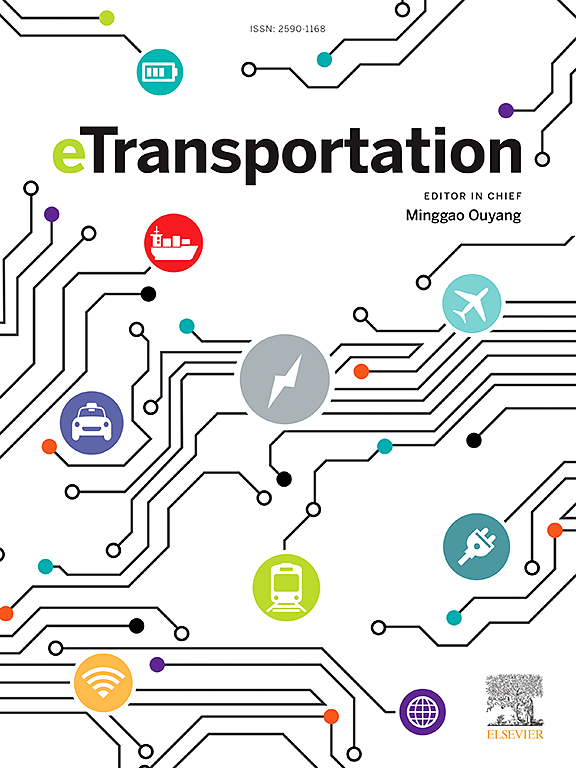人工智能算法优化浸没式沸腾换热策略,缓解锂离子电池热失控
IF 17
1区 工程技术
Q1 ENERGY & FUELS
引用次数: 0
摘要
锂离子电池热失控是引起电动汽车和储能电站火灾事故的主要原因。降低TR对于保证电动汽车和ess的安全至关重要。浸没式沸腾换热技术是减轻锂离子电池TR的一种很有前途的技术。针对袋式锂离子电池正极标签过热引起的TR问题,采用考虑电热模型、集总TR模型和沸腾传热模型的耦合模型,研究了袋式锂离子电池缓解TR的机理。应用人工智能(AI)算法分析参数重要性,预测电池最佳表面热流密度,进而优化冷却剂关键参数,增强电池浸没沸腾传热性能。结果表明,浸没沸煮技术可以缓解袋式锂离子电池因标签过热引起的TR问题。此外,对冷却剂参数的重要性分析表明,密度、粘度和比热容是影响缓解性能的前三个参数。人工智能算法在评估和优化锂离子电池的TR缓解性能方面表现出良好的性能。因此,本工作可为提高电动汽车和ess的安全性提供参考。本文章由计算机程序翻译,如有差异,请以英文原文为准。
Artificial intelligence algorithms optimize immersion boiling heat transfer strategies to mitigate thermal runaway of lithium-ion batteries
Thermal runaway (TR) of lithium-ion batteries is the main cause of fire accidents in Electric Vehicles (EVs) and Energy Storage Stations (ESSs). Mitigating the TR is crucial for keeping safety of EVs and ESSs. The immersion boiling heat transfer technology is a promising candidate for mitigating TR of lithium-ion batteries. In this paper, to address the TR issue induced by tab-overheating at the positive tab of pouch-type lithium-ion batteries, a coupled model, considering electro-thermal model, lumped TR model and boiling heat transfer model, was applied to investigated the mechanism of mitigating TR for pouch-type lithium-ion batteries. Besides, the artificial intelligence (AI) algorithms were applied to analyze the importance of parameters, predict the optimum surface heat flux of batteries and then optimize the key parameters of coolants to reinforce immersion boiling heat transfer performance. The results exhibit that the immersion boiling technology can mitigate TR issue of pouch-type lithium-ion batteries induced by tab overheating. Besides, the importance analysis of parameters of coolants shows that the density, viscosity, and specific heat capacity are the top three parameters that affect the mitigating performance. The AI algorithms behaved a good performance in evaluating and optimizing the mitigating performance for TR of lithium-ion batteries. Hence, this work can provide a refence for improving the safety of EVs and ESSs.
求助全文
通过发布文献求助,成功后即可免费获取论文全文。
去求助
来源期刊

Etransportation
Engineering-Automotive Engineering
CiteScore
19.80
自引率
12.60%
发文量
57
审稿时长
39 days
期刊介绍:
eTransportation is a scholarly journal that aims to advance knowledge in the field of electric transportation. It focuses on all modes of transportation that utilize electricity as their primary source of energy, including electric vehicles, trains, ships, and aircraft. The journal covers all stages of research, development, and testing of new technologies, systems, and devices related to electrical transportation.
The journal welcomes the use of simulation and analysis tools at the system, transport, or device level. Its primary emphasis is on the study of the electrical and electronic aspects of transportation systems. However, it also considers research on mechanical parts or subsystems of vehicles if there is a clear interaction with electrical or electronic equipment.
Please note that this journal excludes other aspects such as sociological, political, regulatory, or environmental factors from its scope.
 求助内容:
求助内容: 应助结果提醒方式:
应助结果提醒方式:


